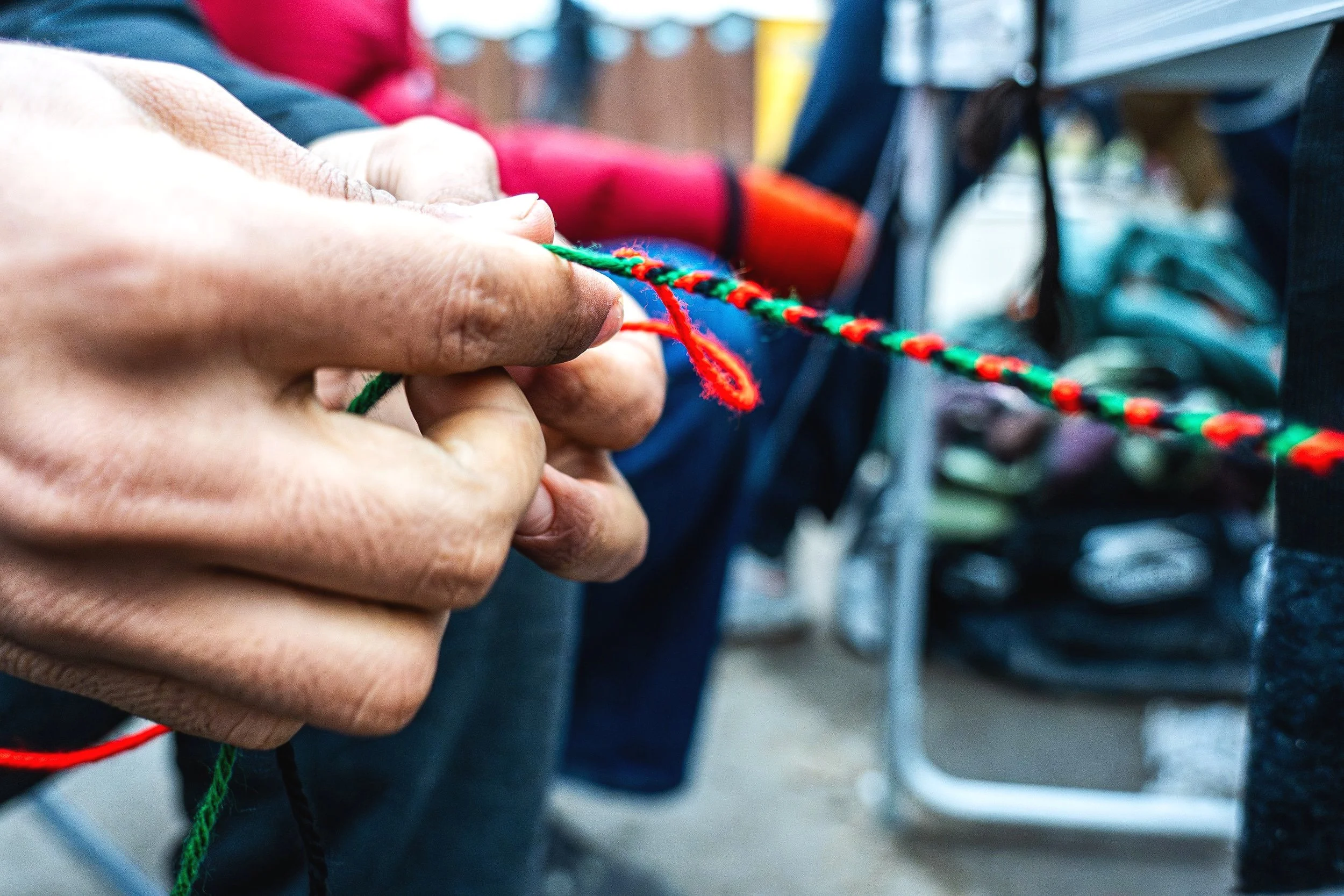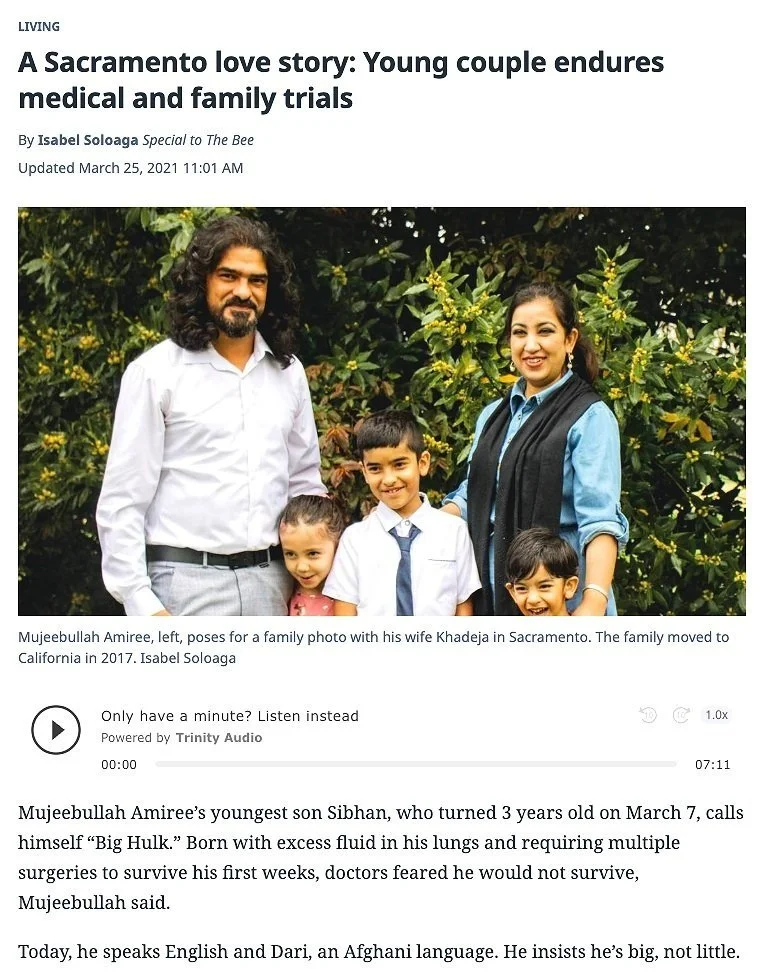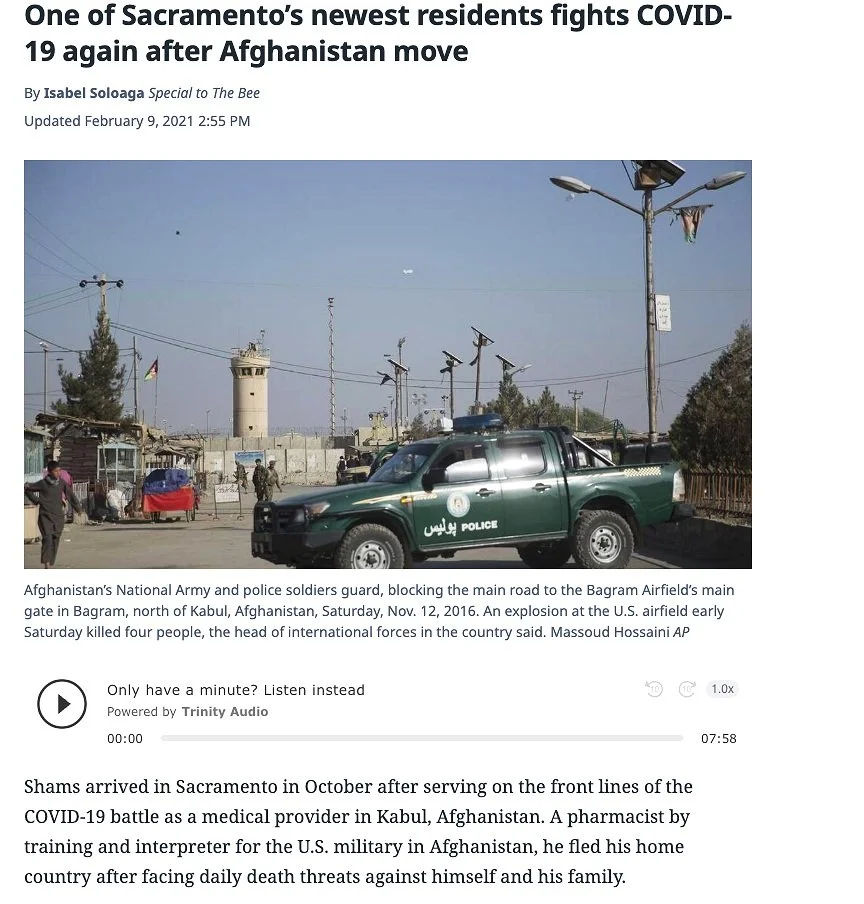Original reporting for The Sacramento Bee.
Beating odds runs in the family. Mujeebullah and his wife Khadeja share a love story that crosses continents. The family relocated to Sacramento in 2017 after experiencing threats of violence because of Mujeebullah’s professional work. In Afghanistan, Mujeebullah worked as a driver for the United States Agency for International Development. There, he won awards for his prowess at driving armored vehicles to deliver essential supplies and equipment to centers all over the country. However, his close professional ties to foreigners made him a target. Sacramento is one of the top U.S. destinations for refugees and special immigrant visa holders like Mujeebullah, who find themselves in danger in their origin countries. The International Rescue Committee resettled Mujeebullah and his family when they arrived in Sacramento. With offices in over 40 countries, the IRC represents one of the largest international resettlement agencies. “The IRC in Sacramento has been serving individuals working with the U.S. military abroad and who then bring their skills and talents,” Lisa Welze, IRC sacramento director, said. “In 2020 alone, the IRC in Sacramento welcomed and resettled over 900 individuals, the highest number resettled in the nation.”
Mujeebullah said it was incredibly difficult to move across the world with his family, especially when they first arrived in Sacramento. Separated from family and loved ones in Afghanistan, he says his oldest son especially misses his grandparents. An Afghani love story It was not the first time Mujeebullah was forced to flee his country. As a child, he and his family fled to Pakistan as refugees in order to escape conflict at home. Years later, when it was finally safe to do so, they returned to Afghanistan. He reentered school and graduated from high school in the same year as his future wife, Khadeja. “It was a marriage of love,” Khadeja said, smiling. She recalled the feeling of butterflies in her stomach whenever they crossed paths. “I saw her on the street one day while we were both in high school,” Mujeebullah remembered. “Since the first time I saw her eyes, I was thinking of only her.” They were in ninth grade. Mujeebullah would bring fruit and other sweets for Khadeja’s younger brother, who attended the same school. In exchange, the boy would carry Mujeebullah’s letters home to Khadeja. For three years, the pair wrote letters back forth. “All these letters I brought with me from Afghanistan,” Mujeebullah said. At the time, they could not afford telephones.
Not only were Mujeebullah and Khadeja from different faith backgrounds, but they were also from different provinces. As a result, both families initially forbade marriage. With his hopes dashed, Mujeebullah fell into a deep depression. “I became silent, hardly speaking to anyone. I was in love with Khadeja, but I thought it was impossible,” he said. Seeing his struggle, Mujeebullah’s parents grew fearful their son might not recover. They decided to reverse their decision: They would entertain the possibility of marriage. “When you want to get married in my culture, the man’s family must go to the woman’s family to propose an engagement,” Mujeebullah said. Despite sending his family to Khadeja’s home several times, her relatives still hesitated. Mujeebullah and Khadeja decided they would formalize their marriage, even if the family would not give their blessing. Mujeebullah’s family traveled to Khadeja’s household once more in a final effort to marry according to tradition. Khadeja’s family finally agreed.
Mujeebullah now talks regularly with his in-laws, who live in Afghanistan. “They love me so much. They say, ‘You are different, but you are respectable,’” he said. Family differences Mujeebullah said Sunni and Shia Muslims have different ways of praying and celebrate unique holidays and traditions. On a macro scale, the differences between branches are serious, leading to wars throughout history. When they married, many of Mujeebullah’s family and friends encouraged him to bring her into his religion, the Sunni branch. However, he decided against asking his wife to change from her Shia beliefs. “I said, ‘We are all human. God creates all people. He creates all the religions. Who am I to decide who should do what?’ We have to respect people for themselves, including for their religion.” Mujeebullah reflected that such an unlikely match would never have been possible only a few decades earlier. Intense conflict over religion remains prevalent throughout Afghanistan, he said. “Right now in Afghanistan, there are many people who say to kill non-Muslims,” said Mujeebullah. “God has created me, you, everyone. We need to respect one another.”
Mujeebullah and Khadeja had their first two children in Afghanistan. Mujeebullah enjoyed a successful career working for USAID before circumstances made it dangerous for him and his family to remain. Fearing for their safety, the family moved to the United States. Today, the couple lives in Sacramento with their three children. Their youngest son, “Big Hulk,” was born at Sutter Hospital. Requiring several life-saving surgeries and requiring assistance to breathe, the child spent three months in the ICU. Today, Big Hulk is healthy, curious and smiling. Life in Sacramento In March 2020, Mujeebullah was working full-time driving with Uber and Lyft when COVID-19 hit. With rideshare apps shut down, he was left without the income his family depended on. “I don’t work for myself,” Mujeebullah said. “I support three families. I work to support myself, my wife, my three kids. In addition, I support my mother and father in Afghanistan, as well as my wife’s family.” Earlier this month, Mujeebullah earned his Class-A commercial driver’s license with support from IRC. The IRC offers a program for refugees to pursue training in the region’s fastest-growing sectors, including the medical field, engineering and transportation.
“I want my kids to have all of the opportunities they can,” Mujeebullah said. “Although it’s a difficult job, it’s my responsibility to make sure they are taken care of.” With three kids clambering over him and his wife beside him, Mujeebullah shared his hopes for the future. “I want to be here for them. With a new job as a commercial truck driver, I will finally be able to put some money aside. I’ll have more to support my family. Someday, my wife and I even dream of opening a small restaurant in Sacramento,” he said.
See more original reporting on the evacuation of Kabul for The Sacramento Bee:


